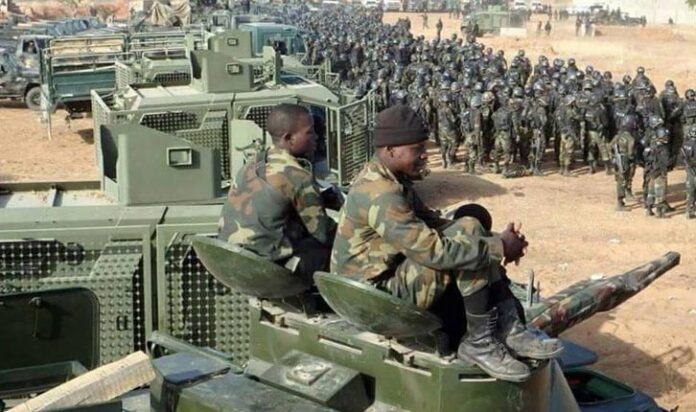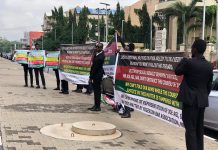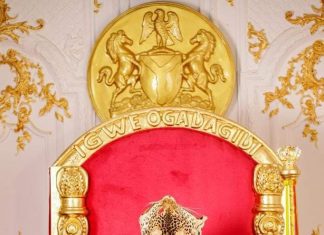I was unprepared for the news regarding the Economic Community of West African States’ decision to encircle the neighbouring Niger with a military force during its strategic and extraordinary conference on the political situation in the Niger Republic. In truth, I was among the many Nigerians who had the bravery to promptly refute the alleged fake news in order to prevent it from festering and becoming true. Eight heads of state from ECOWAS member nations as well as the foreign ministers of Liberia and The Gambia attended the meeting, which was purportedly organised under the direction of President Bola Tinubu.
While Tinubu deserves praise for his fearless demeanour and audacious leadership in the face of the most obvious threat to democracy in the annals of our African history, he should be aware of the boundaries of his authority, particularly in relation to his romance with the legislature, which has the constitutional authority to check the executive during delicate and crucial times like the one we are currently experiencing in Nigeria.
There is no denying that Tinubu holds a crucial position of authority within the community of African countries. Tinubu’s election as ECOWAS’s leader continues to be a brusque affirmation of Nigeria’s status as the continent of Africa’s robotic spirit-machine. In the course of his leadership, we must continue to hope that he receives the greatest honour owed to Nigeria.
It must be made clear, though, that Tinubu’s status as President of Nigeria gave him the exceptional opportunity to lead ECOWAS. The president of Nigeria holds a constitutionally mandated role. A person in a legally recognised position should not act in a way that interferes with the full body of laws that recognise him as the president. It is also important to emphasise that his devotion to Nigeria does not in any way conflict with his loyalty to ECOWAS.
I am not surprised by the important step ECOWAS has taken. Additionally, I don’t believe Tinubu should be held directly or individually accountable for an agreement struck among the ECOWAS members. As the chairman, he could hardly disguise the duties of a football referee and not an autocrat who makes all the decisions. Even though he serves as the chairman of the regional bloc or organisation, no one is required to follow his example in promoting peace by assisting in a diplomatic settlement of the dispute in Niger.
Tinubu has tried to mediate peace by starting many conversations with the obstinate junta in Niger. The desperate junta won’t give up until it has incited Nigeriens to defend their country in a bloody conflict, protecting its head, Abdourahmane Tiani, from the reach of various delegations. Young people in Niger are alleged to have recently created a number of vigilante groups. This was done in an effort to stave off any assault from the rival African nations.
Sanusi Lamido is a member of the delegation skillfully led by former Nigerian Head of State Abdusalami Abubakar. Other members of the mission are Patrice Talon of Benin and Mahamat Deby of the Chad Republic. The obstinate military junta will not accept peace. Niamey, the Niger capital, was reportedly off limits to the Abdusalami Abubakar mission. According to reports, they were imprisoned in a room. Despite the Sultan of Sokoto, a well-known Nigerian monarch, being a part of it, this was the case. From the aforementioned, it is conceivably clear why ECOWAS decided to use force.
However, our president and ECOWAS chairman is unable to personally join this fight. His tongue is likewise twisted, and his hands are bound. At this crucial moment, neither can speak the same language. While his mouth can give the order, his hands are unable to deploy a squadron on the field of gruesome combat. He is limited to a “siddon look.”
By informing the National Assembly about the development in Niger, he has walked the path of honour. He declared his aim to enlist the Nigerian military in this all-out conflict in West Africa. He asked for a “military build-up and deployment of personnel for military intervention to enforce compliance of the military junta in Niger should they remain recalcitrant.”
The contentious request of Tinubu ignited the Nigerian Senate. Representatives from the states bordering neighbouring Niger, the northern caucus, who believed a war against Niger could bring hardship for their people, protested with knowledge. Thinkers have also anticipated that the conflict in Niger will also involve Mali, Burkina Faso, and other militarily dominated nations. Attention has been drawn to Russian President Vladimir Putin’s recent trip to Burkina Faso. Nigerians, who took pride in promoting his name on the streets, have been currying his favour in the meantime.
By explicitly opposing the proposed military intervention in favour of diplomatic relations between the two countries, the Senate exercised its authority under section 5(4) of the constitution. Tinubu was informed of the aforementioned parliamentary resolution.
Despite the preceding provisions of this section, Section 5(4) of the 1999 Constitution states: “Notwithstanding the foregoing provisions of this section: (a) the President shall not declare a state of war between the federation and another country except with the sanction of a resolution of both Houses of the National Assembly, sitting in a joint session; and (b) except with the prior approval of the Senate, no member of the Armed Forces of the Federation shall be deployed on combat duty outside Nigeria.”
Building on the premise of the aforementioned clause, subsection 5 reads as follows: “Notwithstanding the provisions of subsection (4) of this section, the President may, in consultation with the National Defence Council, deploy members of the Armed Forces of the Federation on a limited combat duty outside Nigeria if he is satisfied that the national security is under an imminent threat or danger: provided, however, that the President shall, within seven days of actual combat engag
Nigeria cannot be claimed to be under a threat in this situation that is serious or immediate enough to justify acting prematurely. A request had been made, but it had been denied. Tinubu is unable to ignore this flagrant constitutional clause that prevents him from launching any intervention in support of ECOWAS. He need only approve of the military conflict that has been declared with the Niger junta. As the President of ECOWAS and not the President of Nigeria, he is also allowed to endorse the action. It is entirely permissible to rebel against any upcoming executive orders in this regard.
Tinubu must constantly keep in mind that he was chosen as president in a democratic process, not as a military commander. In a constitutional era and creation, he cannot issue unconstitutional orders. The authors of the constitution are aware that the Commander-in-Chief must collaborate with the legislators on problems of war since they are too complex for him to consider alone. Even though he has demonstrated that he is aware of this clause by writing to the Senate, he should not ignore it.
Join Television Nigerian Whatsapp Now
Join Television Nigerian Facebook Now
Join Television Nigerian Twitter Now
Join Television Nigerian YouTUbe Now





